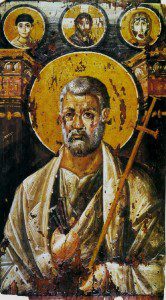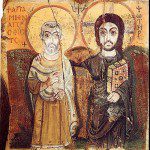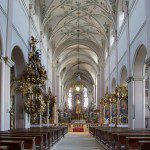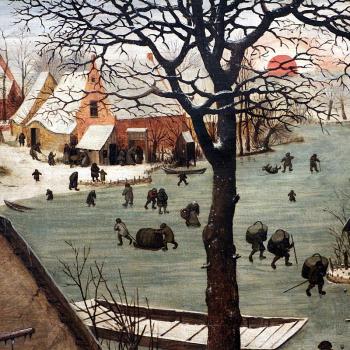
Here I am proud to present part three of this three-part series on the Great Schism of 1054. Parts I and II may be found here and here respectively.
However, in a letter to the Patriarch of Antioch written shortly after the document of excommunication, Cerularius does, in fact, go on to attack the entire Western Church in much stronger terms. To begin with, Cerularius says that he has heard that Peter of Antioch considers himself in communion with the Church of Rome, and prays for the Pope during his Eucharistic liturgy. Cerularius, however, takes strong offense at this state of affairs: “I did not think that anyone blundered such an ignorant oversight!” (Caer. Petr. IX). For, according to Cerularius, from the time of the “Fifth Ecumenical ” (IX), because “Pope Vigilius would not attend at that Council” (IX), the Church at Constantinople has not prayed for the Pope during the Liturgy. Indeed, “from then”—almost exactly five hundred years before 1054— “even till now,” Cerularius says, “the Pope has been cut off from the Holy Catholic Church” (IX).
This is an enormous and embarrassing inaccuracy. As a matter of fact, Cerularius is trying to refer to the Sixth, not the Fifth Ecumenical Council, which Pope Vigilius did initially refuse to attend. As Peter of Antioch was later to point out, however, Pope Vigilius did eventually agree to the Council and rescind his excommunication of the Patriarch of Constantinople, returning the two Churches into communion with each other and giving the Council its Ecumenical status; and another Pope had, of course, more recently participated in the Seventh Ecumenical Council, in full communion with Constantinople. Indeed, the Churches had been in communion with each other for quite a long time in 1054, and had prayed for one another in their liturgies throughout this time. According to Cerularius, however, the incident had not at all created a new schism: the two Churches were already in Schism by 1054, and had been for five hundred years.
Unsatisfied, Cerularius proceeds to berate Peter of Antioch for his belief that, besides the use of unleavened bread, the Western Church is completely orthodox. As a matter of a fact, Cerularius says, the Westerners “are wholly lovers of falsehood and bad workers” (XI), “not spitted by one missile alone—the one about the Azymes, the one known clearly to all—but by many and diverse missiles” (XI). Cerularius then proceeds to list the Westerners’ sins and crimes in a dizzying list of customs and theology. Among their detestable practices are “that they eat things strangled, and that they shave, and that they keep the Sabbath, and that they eat blood, and that their monks eat pork fat […] and that on the first Saturday of Lent […] they fast from meat and eat only dairy, and that they eat meat on Wednesday, and on Friday they eat dairy and eggs, and on Saturday they fast the whole day” (XII). Likewise, Cerularius takes issue briefly with the filioque addition to the Creed, as well as with the Western additions to the Sanctus, the practice of clerical celibacy, the Sign of Peace in the Liturgy, the wearing of rings by Bishops, the practice of baptism with one immersion and using blessed salt, and the practice of allowing two brothers to marry two sisters. He accuses some Western Bishops of fighting in battles as secular lords, and Western Christians in general of refusing to venerate relics or honor the great Eastern Saints, and he also claims that “some of them do not venerate the Holy Icons” (XIV). Given these manifold abuses and many others, Cerularius asks, “do they seem to those thinking well to be numbered with the wholly Orthodox? I think not” (XIV). Indeed, he points out that the only people who think that the Westerners are orthodox are the Westerners themselves. Yet, Cerularius says, these are not the Westerners’ greatest sins. Rather, their greatest crime, the one “graver and more insupportable than everything, and showing forth their insanity over and above everything” (XV), is the one exemplified by the Roman legates, “because they say that they arrived here not to be taught or to be argued with, but rather to teach, and to persuade us to hold their dogmas […] with authority and surpassing shamelessness” (XV). The great sin of the West is arrogance.
These are the two accounts of the two men at the heart of the incident of 1054. Much in these accounts can be disputed. All historical evidence, and all common sense, is against Cerularius’ argument that the Roman legates were not, in fact, from Rome, and it is probable that not even he really believed it. Likewise, it can be questioned whether or not Humbert was really ignorant of the Pope’s death when he decided to take his drastic, and independent, action. Yet however these two accounts are to be blended, the events of 1054 do not represent a mythological account in anyone’s favor.
To round out our account, I will proceed to a third perspective: that of Peter of Antioch, a committed Eastern Christian, and the recipient of Cerularius’ report about the incident. In his return letter to Cerularius, Peter finds a certain amount to agree with; he finds the use of unleavened bread distasteful, and is horrified by the addition in the Creed. Yet at the same time, Peter is anxious above all to be charitable towards his Western brethren, respect their legitimate traditions, and preserve unity within the Church. When Cerularius argues that the Church of Rome has been cut off from the Church for five hundred years, Peter is utterly horrified: “I am filled with shame at your honored letter containing these things; I do not know what I should say, believe me, and especially for your sake […] because before examination and perfect apprehension you out of a rash hearing presented what is not as if it is” (Peter III). Peter knows for a fact, from eyewitnesses, that, as late as forty-five years before, the Pope had been prayed for in the Church of Constantinople (V); and he castigates the carelessness of Michael’s record-keeper, who not only mistook the Sixth Ecumenical Council for the Fifth, but also got its events completely wrong (III-IV). Then, Peter goes over each one of Michael’s charges in turn, dismissing some (“what is it to you that their High Priests shave their beards and that they wear rings?” (VI)), agreeing with a few, rejecting others by appeals to the traditions of the Eastern Church, and urging caution on all. For, Peter says, rumors are often inaccurate, and often discreditable things happen in both East and West without the consent of the ecclesiastical authorities (XVII). It is also necessary, he says, to incline always towards charitableness, especially since the Westerners are more rustic and less educated than their Eastern brothers, and have been ruled by barbarians for centuries (XIV). In summary, Peter advises Cerularius that “if they will set right the addition in the Holy Creed, I would seek nothing more” (XXII), abandoning all the other charges—including the use of unleavened bread— as ultimately indifferent. For Schism between East and West would be nothing less than a disaster; this much Peter of Antioch is sure of.
To give this third perspective—neither that of Cerularius nor that of Humbert—its due, I will end with Peter’s plea for unity and tolerance within the Church, which rings out as strongly now as it did a thousand years ago, in that strange and fateful year of 1054:
And I exhort you and beseech you and beg you and intellectually lay hold of your holy feet, so that conceding when you are too severe you might accommodate yourself to these deeds. For be afraid lest wishing to sew up a tear you make a worse schism, and laboring to set upright a fall you make a worse fall. And take care lest from this long separation and disagreement, when openly indeed this Great and First and Apostolic See of Rome has been broken off from the Holy Church among us, it happen that all evil in life be multiplied, and the whole Cosmos go badly, and the kingdoms of the whole Earth be disturbed, and there be everywhere lament, and much woe, and famines, and continuous plagues in country and city, and it happen that our armies never succeed anywhere at all.
This piece is by Nathan Smolin a Catholic Convert and current PhD student in Classics at the University of North Carolina, Chapel Hill.













